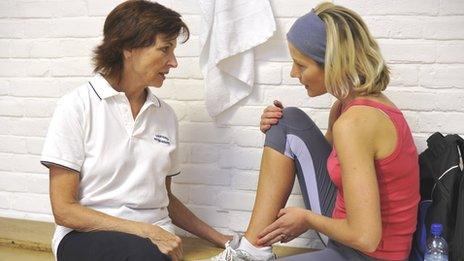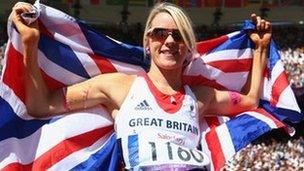London 2012: Physios report Olympics injury 'legacy'
- Published

Those inspired to take up more exercise following the Olympics should take measures to prevent injury, say physiotherapists
Physiotherapists are reporting an increase in sports injuries among members of the public trying to emulate their London 2012 heroes.
Private health group BMI Healthcare said it had seen a 20% spike over the Olympic and Paralympic summer.
The most common injuries were soft tissue injuries, neck pain, lower back pain and cartilage injuries, it said.
Carmarthenshire-based physio Dean Locking said those inspired to exercise more should consult their GP first.
On Monday the streets of London were lined with thousands of people wanting to get a glimpse of Great Britain's Olympic and Paralympic competitors as they paraded in 21 floats to Buckingham Palace.
Over the summer Olympic and Paralympic medal winners, including Mo Farah, Jessica Ennis, Ellie Simmonds and David Weir have captured the public imagination.
Mr Locking, physiotherapy manager at Werndale Hospital at Bancyfelin, Carmarthenshire said: "The fact that more local residents have been inspired by Team GB and other sports heroes is fantastic and truly highlights the legacy the games could have.
"While we wouldn't want to discourage anyone from becoming more active or taking up a sport, it is widely acknowledged that newcomers to a sport or exercise are significantly more likely to be injured than individuals who have been training for many years.

Paralympic discus gold medallist Josie Pearson was among Welsh competitors to inspire over the summer
"Experienced athletes are stronger and more co-ordinated than beginners."
'Challenge'
Mr Locking said that before the Olympic and Paralympic games began he had been sceptical about their leaving a legacy in terms of increased physical activity among the public.
As if to back him up the latest Welsh health survey, published in August, showed that one in three people in Wales take no exercise - 36-38% of women and 30-32% of men.
But he said it was already becoming clear that people who had previously done little in the way of sport were starting up, and others who had taken part to a mediocre level were trying to make the next step up.
"This will obviously benefit them," said Mr Locking. "But the challenge is to make this a long term not a short term legacy, with people not doing too much too soon and then giving up again because they get injured.
"If people are inspired by the Olympics, Team GB or any of this summer's sporting events, it is advisable they speak to their general practitioner, physiotherapist or medical professional before embarking on an exercise regime."
Mr Locking said it was equally important to find out more about preventative measures which help make the most of their exercise and prevent injury.
BMI Healthcare found 81% of the physiotherapists it surveyed said running was the most injury prone activity.
This was followed by football with 79% and rugby with 65%. Going to the gym (27%) and playing tennis (27%) were also rated as some of the more injury prone activities.
'Inspirational'
James Rind, a spokesman for the Chartered Society of Physiotherapy, said he was not surprised by the upturn in sports-related injuries.
"It's been a really inspirational event and people have been trying to create a legacy," said Mr Rind, who runs a physio practice in Cardiff.
Mr Rind said it was "much better" for people to be running around and becoming more active than to be sat on the sofa in front of the TV.
But he warned: "People are getting super-motivated and going out running three or four times a week without resting in between and their bodies are just not ready for that.
"It's really important that folk take advice. Whether we are all going to become Mo Farahs is unlikely but it's all relative and overall we should all be looking to achieve a higher level of fitness."
- Published11 September 2012
- Published29 August 2012
- Published14 August 2012
- Published13 August 2012